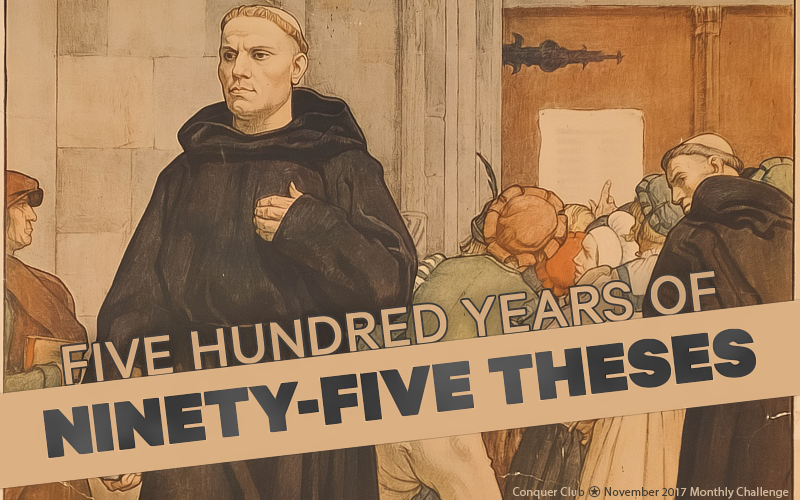Brought to you by the Community Team.

CLICK HERE TO JOIN WAITING GAMES
On October 31st, 1517*, Martin Luther posted 95 Theses on the door of a church in Wittenberg. At the time it must have seemed like a minor point. After all, academic disputes are common. It can be said that a scholar's job is to disagree. In retrospect this publication was seen as the beginning of the Reformation, a total upheaval of Western Christianity that still resonates today.
The actual details of the theses aren't all that interesting. Theologians are always discussing, re-adjusting and bringing the message of Christianity into the current era. What is interesting is that over the previous thousand years, the bishop of Rome, papa or pope became the accepted leader of Western Christianity and the Reformation changed that. The controversy caused by Luther created a brand new episcopate structure in Germany. This was followed by a split of the Church in England then the Calvinist movement and culminated 100 years later in the Thirty Years War, which brought about the end of Feudalism and the effective end of the Holy Roman Empire, ending a period in History which began with Clovis' conversion to Christianity in the 5th century.
The first three theses amount to a conception of repentance, which indicate that repentance is a personal endeavor, not one administered by the church. Luther was writing during the Renaissance, when the ideas of individualism which are so predominant today were just beginning. It's easy to read through a modern lens and say "obviously repentance is personal" but what makes it obvious is years of Luther's thought influencing that modern perspective. Taken to the extreme, this would mean that repentance is only personal, and has nothing to do with the church at all, which is a common sentiment today.
500 years later, Luther's influence is starting to be challenged. In 2009, Catholics and Lutherans drafted a "Joint Statement on Justification" which would have been unthinkable for much of the previous 500 years, as the different doctrines of Justification were one of the things that Luther considered irreconcilable with Roman Catholicism. Modern Lutherans also started what is called the "New Perspective on Paul" which argues that Luther misunderstood Paul's writings on justification by works as not being against good works in general per se, but rather against Jewish identity-related works in particular.
The maps this month represent 2 things that are in their tail years (the Holy Roman Empire and Feudalism) and one thing that is in full swing (the age of Exploration). The Portuguese had already gone to India via sea. Columbus had already reached America. Panama had been crossed, and the Conquistadors were about to start subjugating the Aztecs. There have been a lot of German-themed challenges this year, so these maps will provide a historical setting, rather than a direct connection.
*The Julian calendar was still in use then, so even though "Reformation Sunday" is celebrated most places in October, it could also be in November.
NO SIGN-UPS REQUIRED
SETTINGS
Maps: Holy Roman Empire, Feudal War, and High Seas
Players Per Game: 6
Game Type: Terminator or Standard
Initial Troops: Automatic
Play Order: Sequential or Freestyle
Spoils: Escalating or No Spoils
Reinforcements: Chained or Parachute
FOG: MANDATORY
TRENCH: Optional
Round Limit: Any
Round Length: Any
Joinablility: Public Only
MEDAL CRITERIA
Tokens are for WINS only.
95 points are required for a medal and at least ONE of each token type.
Each GOLD Token is worth 15 points - Holy Roman Empire
Each SILVER Token is worth 10 points - Feudal War
Each BRONZE Token is worth 5 point - High Seas
NOVEMBER SCOREBOARD
Notes
- Games must start between CC Time: 2017-11-01 09:00:00 and CC Time: 2017-11-30 23:59:59 to be considered for the challenge.
- Wins will count until CC Time: 2017-12-31 23:59:59
- Any issues will be solved by me, DoomYoshi, and my word is final.






